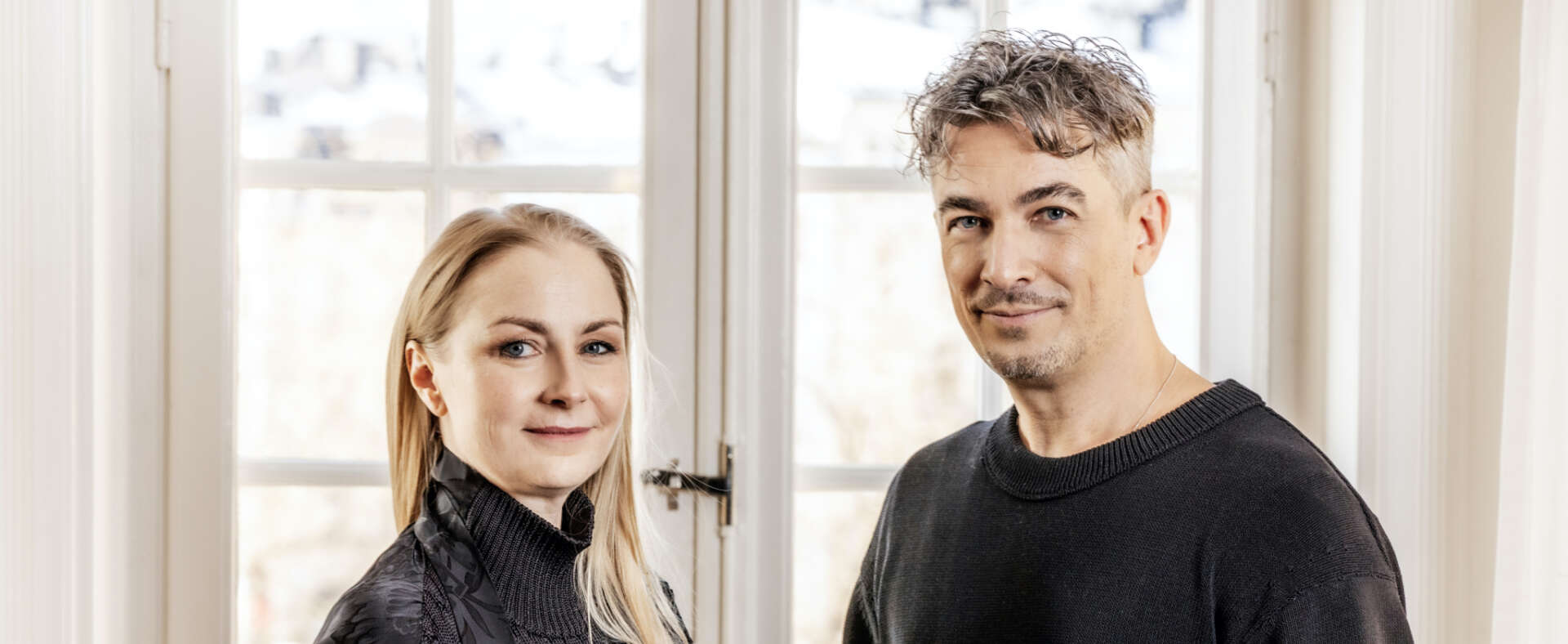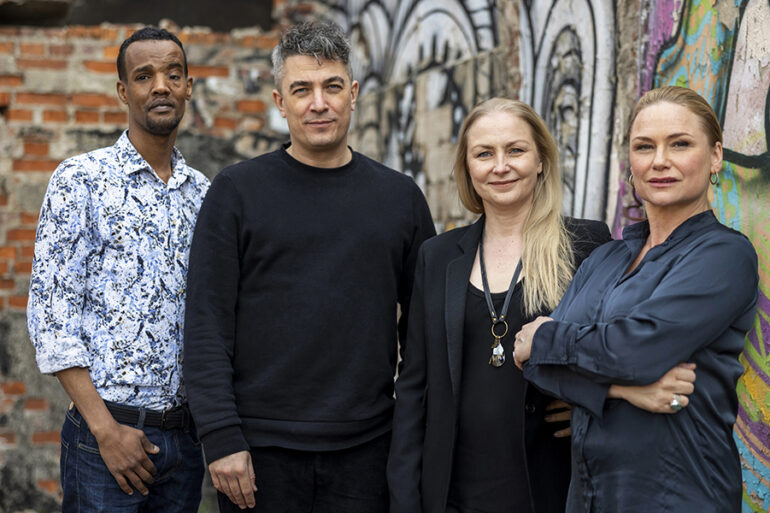
The first collaboration between The Truth Will Out writer and Tove director just premiered on SVT Play March 10 and SVT1 March 13.
All3Media handles global sales.
Watch the Swedish trailer: CLICK HERE.
Detective #24 (Detektiven från Beledweyne) is a new twist to the classical procedural genre, carried by a topnotch team of professionals on both sides of the camera: Swedish creator/writer Aron Levander The Truth Will Out, Jordskott), Finnish director Zaida Bergroth (Tove, Maria’s Paradise) in her series debut, and B-Reel Films (B.RF) producer Ulf Synnerholm (Top Dog, Agatha Christie’s Hjerson).
The original screenplay headlines an unlikely investigating duo: Tilda an impulsive and messy former police prosecutor, now working at a refugee centre near Uppsala, and Ibrahinn, a Somali asylum seeker (known as #24 in the detention centre) who turns out to be an ace detective.
When a teen girl goes missing near the refugee centre in small town Karkebo, Tilda who was recently fired from her job as police prosecutor, realises that Ibrahinn has a gift for solving crimes. She sees an opportunity to secretly present his thoughts as her own, in order to regain her self-esteem and hopefully her job. Ibrahinn for his part also needs her to avoid being sent back to Somalia. The two start to collaborate and get involved in two further cases. Meanwhile the local police officer Mats Drevlid suspects the dupery.
In the title roles are Malin Levanon (Drifters, Clark), newcomer Nasir Dhagole and Kristofer Kamiyasu (Hitman’s Wife Bodyguard).
The B.RF series was co-produced by SVT, ZDF and Film i Väst, with support from Nordisk Film & TV Fond.
We spoke to Aron Levander & Zaida Bergroth:
Crime seems to be your favourite genre Aron. Where does this passion come from and how did you come up with the idea for Detective #24?
Aron Levander: Yes I have worked predominantly in crime and this is still one of the most popular genres, so I get a lot of offers to work in that genre. This project grew out of that love, and I was keen to create something fresh that would break away from the usual procedurals. I hope this will be exciting for viewers as this offers an entertaining crime plot, twined with a societal theme. I was actually inspired by Maj Sjöwall and Per Wahlöö who used the crime genre to say something about our society-back in the 60s.
How did you come up with this unusual investigative duo?
AL: I wanted to use the classic crime tools, and challenge the stereotypes. It was fun to use the classic whodunnit detective story with a more character-driven drama. So I would describe this series as a character-driven crime drama. One of today’s biggest issues in the Western world is migration. From that starting point, I developed the concept of an investigative duo, forced to collaborate. I flipped the hierarchy between the two main characters, with the main detective forced to work under the guidance of a refugee. That was the starting point for the series.
Tilda is full of flaws, almost irritating, yet very human. What was your inspiration for her?
AL: She is actually based on a real person, but many people can identify with her. She has the flaws that anybody could have, plus a good dose of humour, so it’s easy to forgive her.
When we cast Malin Levanon, we were looking for an actress who could embody Tilda's softness, earnestness, and who could also be cruel and calculating. There is not an inch of evil in Tilda, but she acts in a messy way.
Zaida this is quite a break from your previous work in Finland and on feature film. At what point did you board the project?
Zaida Bergroth: After Tove, I was wondering what to do next. I read many scripts and was thrilled to be offered this one. I literally fell in love with it. The way the screenwriter sees the world, the characters, and what he had to say. Both Tilda and Ibrahinn feel real. Behind her bravado, Tilda hides a loneliness. And the more mistakes she makes, the more I would feel for her. At the same time, Ibraahinn struggles for his life and also suffers from loneliness. Then the tone which combines depth, drama and entertainment, was something I hadn’t seen before.
How did you cast Nasir Dhagole as Ibrahinn, and trained him for the part?
ZB: Nasir himself came to Sweden as a refugee. He is a poet, with stage experience, and he was a teacher in Mogadishu. We went through a difficult casting process before we found him. The first self-tape we saw of him really caught our eyes. We also needed someone calm, with a strong presence, who could be a contrast against Tilda’s force of nature. He also had the in-built experience of his characters’ traumatic past in Mogadishu. He simply brought with him that weight and depth. He came to Finland, where he took part in an acting workshop. He learned some techniques., but he is a natural talent.
In this high concept show, there is a rare mix of humour, drama and suspense. How difficult was it to find the right balance Aron?
AL: That was precisely the main challenge for us. When we first spoke about the series with Zaida and Ulf, our producer with whom I worked very closely to create the series, we had a clear intuitive understanding of this balance. Zaida also had a good understanding of what we were aiming for. This is why I wrote all episodes myself. The earlier versions were too funny, so we went back, to add some crime quality to the show. It wasn’t easy to find the right balance.
You have written the series with a whodunnit plot over two episodes. Why this choice?
AL: This not a story about a refugee finding his way from Somalia to Europe and Sweden. It’s a vision of the Swedish migration system with its imperfections, that we explore through a crime thread. Through the three different cases, we could shed a new light on various issues that you can encounter as a refugee in Sweden.
Zaida could you discuss your visual style?
ZB: We wanted to keep it real, not glossy. We discussed some references, such as the black humour of the Coen brothers, we mentioned Twin Peaks at some point. But as you start working, the main characters set the tone and you see the universe building around them.
Ultimately, what do you hope the audience will take away from watching the show?
AL: Firstly I hope it will be entertaining and surprising. In a nutshell, it’s a story about tolerance, being open minded and open hearted, just like these two opposite characters who achieve amazing things together and ultimately become friends. I hope to get as broad an audience as possible, and challenge their prejudice in all directions.
Do you have a second season in the works?
AL: I am working on a possible continuation, as we do have a format running now. It would be great to expand this wonderful universe and the characters, but nothing is confirmed.
What’s next for you?
ZB: I have a feature film in development.
AL: I have various projects, several series and a feature film.
